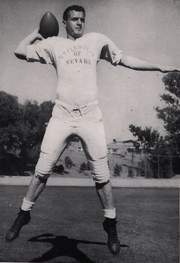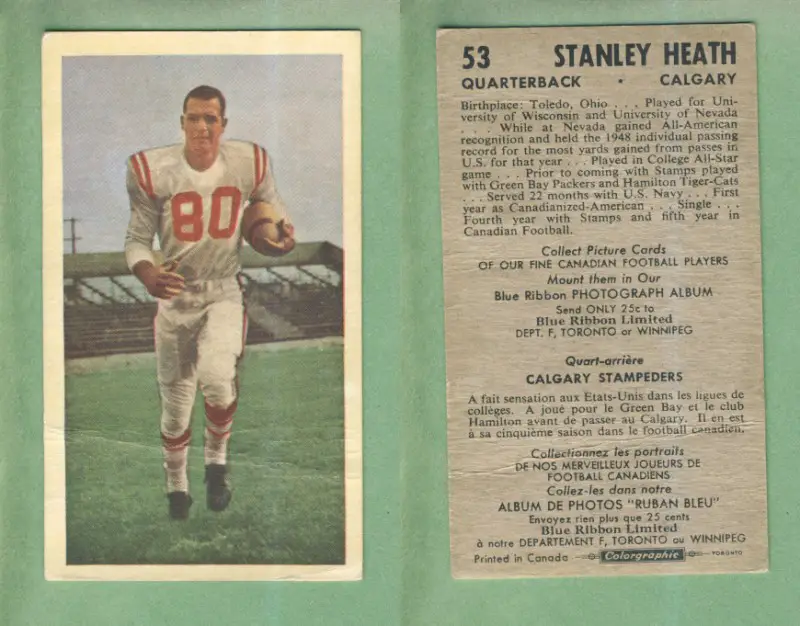Stan Heath was an All-American quarterback (1948) who started his college football career at Wisconsin and then played two years at Nevad in 1947 and 1948. Utilizing Heath's arm in an age of run dominated offenses, Nevada made it into the top 10 in rankings in 1948 and palyed in Bowl games in both 1947 and 1948. In 1948, Heath led the nation in passing in 1948 and was fifth in the Heisman trophy voting. Heath was a first round draft pick (fifth overall) in the 1949 college draft by the Green Bay Packers. After one season in Green Bay, Heath came to Canada in 1950 where he was part of the first ever Hamilton Tiger-Cat team formed by the merger of the Hamilton Tigers and the Hamilton Wildcats. After one season with Hamilton, Heath had a tryout with the Cleveland Browns before being released and returning to the CFL, but he lost his job in Hamilton to Bernie Custis and ended up in Calgary where he would play for two seasons (1951 and 1952). In September of 1953, Heath was resigned by Hamilton when the Tiger-Cats released Bob Celeri. Heath's return to Hamilton didn't last long as he had an arm injury and only played part of one game. Hamilton released Heath and he filed a law suit against the Tiger-Cats for $10, 000, claiming he had a no rlease contract. The case went to trial in February of 1954 and eventually Hamilton and Heath settled out of court. Heath then returned to the Stampeders in 1954. Stan Heath passed away on September 26, 2010.
\Stan Heath, QB Of Nevada Bowl Teams of 1940s Bowl Teams Dies at 83
Heath Leads Hamilton to Big Four Final Win - November 11, 1950
Stan Heath Interested In Playing In Hamilton - August 8, 1951
Stan Heath Joins Calgary Pro Team - September 5, 1953
Stam Heath Now With Hamilton - September 5, 1953
Heath Out With Arm Injury - September 15, 1953
Heath Files Suit Against Hamilton - September 23, 1953
Heath Case Goes To Court - February 15, 1954
| Year | Team | GP | PA | PC | % | Yds | TD | Int | Sacked | Yds | TC | Yds | Avg | Avg | TD |
|---|---|---|---|---|---|---|---|---|---|---|---|---|---|---|---|
| 1950 | HAM | 12 | |||||||||||||
| 1951 | CAL | 174 | 81 | 46.7 | 1167 | 7 | 13 | 23 | 88 | 3.8 | 3.8 | 0 | |||
| 1952 | CAL | 51 | 25 | 49 | 366 | 2 | 4 | 3 | 0 | 0 | 0 | 0 | |||
| 1953 | CAL | 0 | 0 | 0 | 0 | 0 | 0 | 0 | 0 | 0 | 0 | 0 | |||
| 1953 | HAM | 0 | 0 | 0 | 0 | 0 | 0 | 0 | 0 | 0 | 0 | 0 | |||
| 1954 | CAL | 52 | 25 | 48 | 471 | 1 | 4 | 4 | -16 | -4 | -4 | 0 |
Only scoring and some games played stats were kept in the East until 1954. Heath had one touchdown and 5 points in 1950 with Hamilton. The West did not start keeping games played stats until 1964.
| Year | Team | F | FL |
|---|---|---|---|
| 1950 | HAM | ||
| 1951 | CAL | 0 | |
| 1952 | CAL | 0 | |
| 1953 | CAL | 0 | |
| 1953 | HAM | 0 | |
| 1954 | CAL | 1 |

